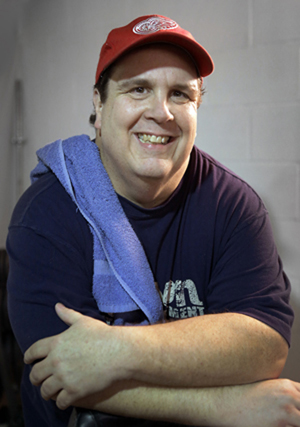 By Linda Barlow, Genesis
By Linda Barlow, Genesis
U.S. News: Genesis a “top performer” in endocrinology and diabetes care
Chris Hermann will tell you that having Type 2 diabetes is the best thing to ever happen to his health. His diabetes diagnosis motivated him to reverse the self-destructive snacking and sedentary lifestyle that had caused his weight to balloon to 390 pounds.
The day he walked into the Genesis Diabetes Care Center was the day he awakened to the fact that he needed to manage his chronic disease with healthier eating habits, more physical activity, medication, and regular blood sugar monitoring to help avoid serious health complications.
He has done just that.
Since July 2013, he has lost 115 pounds. He exercises every day in his basement gym and limits sweets, pasta, and bread. He celebrates the small strides: the way his clothes get a tad baggier each month; the fact that he can fit into restaurant booths; go to a movie theater without worrying about getting stuck in the seat; and, enjoy a hike at Wildcat Den or Maquoketa Caves without painfully twisting an ankle because of his weight.
“Having diabetes has changed my life for the better. To manage my disease, I’m eating healthy, exercising, and doing the right things to keep my blood sugar under control,” says Hermann, 50, of Durant, Iowa.
“Before my diagnosis, I was a food addict who would sit on the couch, eat Oreos, watch some TV, have some popcorn, then watch some more TV. I’d been a ‘yo-yo’ dieter for quite some time. It just got out of control. I thought I was indestructible, but it caught up with me a couple of years ago and started affecting my health.”
His family physician tested him for diabetes. He also referred him to a cardiologist because of swelling and discoloration in his legs, which led to vein surgery in each leg to improve his circulation.
Hermann credits a frank talk from his family physician, Dr. Mark Iltis of Genesis Health Group and the staff at the Genesis Diabetes Care Center for helping him get on a healthier path. The center’s team consists of endocrinologists, nurse educators, and dietitians — all who are Certified Diabetes Educators. This year, U.S. News & World Report named Genesis as a “top performer” in endocrinology and diabetes care.
“The diabetes self-management class and the staff at the Diabetes Care Center really opened my eyes to the medical aspects of diabetes — the role of the pancreas and insulin and how although there is no cure for diabetes, the best drug you can give yourself for this disease is to eat right and exercise.”
The positive reinforcement of the health professionals at the Diabetes Care Center helped, too.
“They’re such kind, non-judgmental people, and they help motivate you to make better choices for your health,” Hermann says. “I’ve learned the importance of portion size and using my carbohydrates wisely. I have more control over food now than I ever have in my life, mostly because I’m aware of the health complications that can develop if I don’t manage my disease and control my blood sugar.”
When he was referred to the Diabetes Care Center, he had an A1C of 7.6 mg/dl. A year later, it had decreased to 6.3 mg/dl. A1C gives a picture of a person’s average blood glucose (blood sugar) over the past two to three months. Those with a reading of 6.5 mg/dl or higher are diagnosed with diabetes.
In the year he was under the center’s care, he lost 66 pounds and was able to lower the dosage of his diabetes medication. He learned to make “SMART” goals — goals that are Specific, Measurable, Attainable, Realistic and Timely.
“Something that really impressed me about Chris was that he chose goals he could live with and stuck to them,” said Anne Bormann, RN, diabetes nurse educator at the center.
“For example, he would come home from work, immediately change his clothes and not do anything else until he had his workout. He made small changes in his life that led to long-term outcomes. As his diabetes educator, it was such a thrill to be able to celebrate his successes with him.”
Hermann concludes: “Diabetes has motivated me. I can’t put into words how good I feel eating the foods that have helped me to become healthier than I have in years. When I leave the house, I have a smile on my face because I know I can go for a walk without hurting. All these lifestyle changes have helped my diabetes, too.”
For more information about our diabetes services, please contact the Bettendorf Office at 563-421-3261, or the Silvis Office at 309-281-2200.
Symptoms of Diabetes
The best way to know if you have diabetes is to visit your doctor or community health clinic regularly for routine blood work. Some people may experience the following symptoms of diabetes:
- Very thirsty
- Frequent urination
- Blurred vision
- Tired
- Frequent infections
Some people never experience these symptoms, and often they do not become evident until the diabetes is out of control. Also, any or all of these symptoms may be a sign of other conditions that can only be diagnosed by a doctor.
